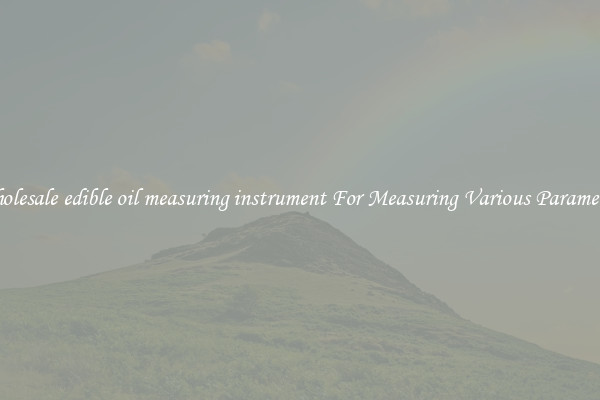Wholesale edible oil measuring instrument For Measuring Various Parameters
Wholesale edible oil measuring instruments play a crucial role in the food industry, ensuring accurate measurement of various parameters necessary for maintaining the quality and consistency of edible oils. These instruments are designed to provide reliable and precise measurement of parameters such as moisture content, fatty acid composition, viscosity, density, and acidity levels in different types of edible oils.

One of the primary parameters measured by these instruments is the moisture content in edible oils. Moisture content affects the quality and shelf life of oils, as excessive moisture can lead to microbial growth and rancidity. The wholesale edible oil measuring instruments utilize advanced technologies such as the Karl Fischer titration method to accurately determine the water content within the oil samples, ensuring the oils meet the desired quality standards.
Another critical parameter that these instruments measure is the fatty acid composition of edible oils. Different oils have different fatty acid profiles, and knowing this composition is essential for various purposes, including nutritional labeling and determining the oil's suitability for specific applications such as frying or salad dressings. Wholesale edible oil measuring instruments employ gas chromatography techniques to separate and quantify the different fatty acids, providing producers with valuable information for product labeling and quality control.
Viscosity is another essential parameter measured by these instruments. It refers to the thickness or fluidity of the oil, which affects its handling, pumping, and flow characteristics. Different oils have different viscosities, and measuring this parameter helps ensure consistency in product performance. Wholesale edible oil measuring instruments employ viscometers, which determine the dynamic viscosity of oils, allowing producers to adjust viscosity levels according to their specific requirements.
Density is yet another crucial parameter that these instruments measure. The density of edible oils affects their weight and storage requirements. It also plays a role in determining the oil's energy content and nutritional information. Wholesale edible oil measuring instruments use methods such as pycnometry to accurately determine the oil's density, aiding producers in controlling and optimizing their product formulations.
Lastly, wholesale edible oil measuring instruments measure the acidity levels of oils. Acidity levels indicate the oil's freshness and quality, with higher acidity levels indicating a more extensive breakdown of the oil's fatty acids. Instruments such as potentiometric titrators are used to determine the acid value of edible oils, allowing producers to monitor and control the products' quality throughout their shelf life.
Wholesale edible oil measuring instruments are essential tools for the food industry, providing accurate measurement of various parameters critical for maintaining the quality and consistency of edible oils. By utilizing advanced technologies and techniques, these instruments enable producers to ensure their products meet the desired standards, resulting in safe and high-quality edible oils for consumers.

View details

View details

View details

View details







